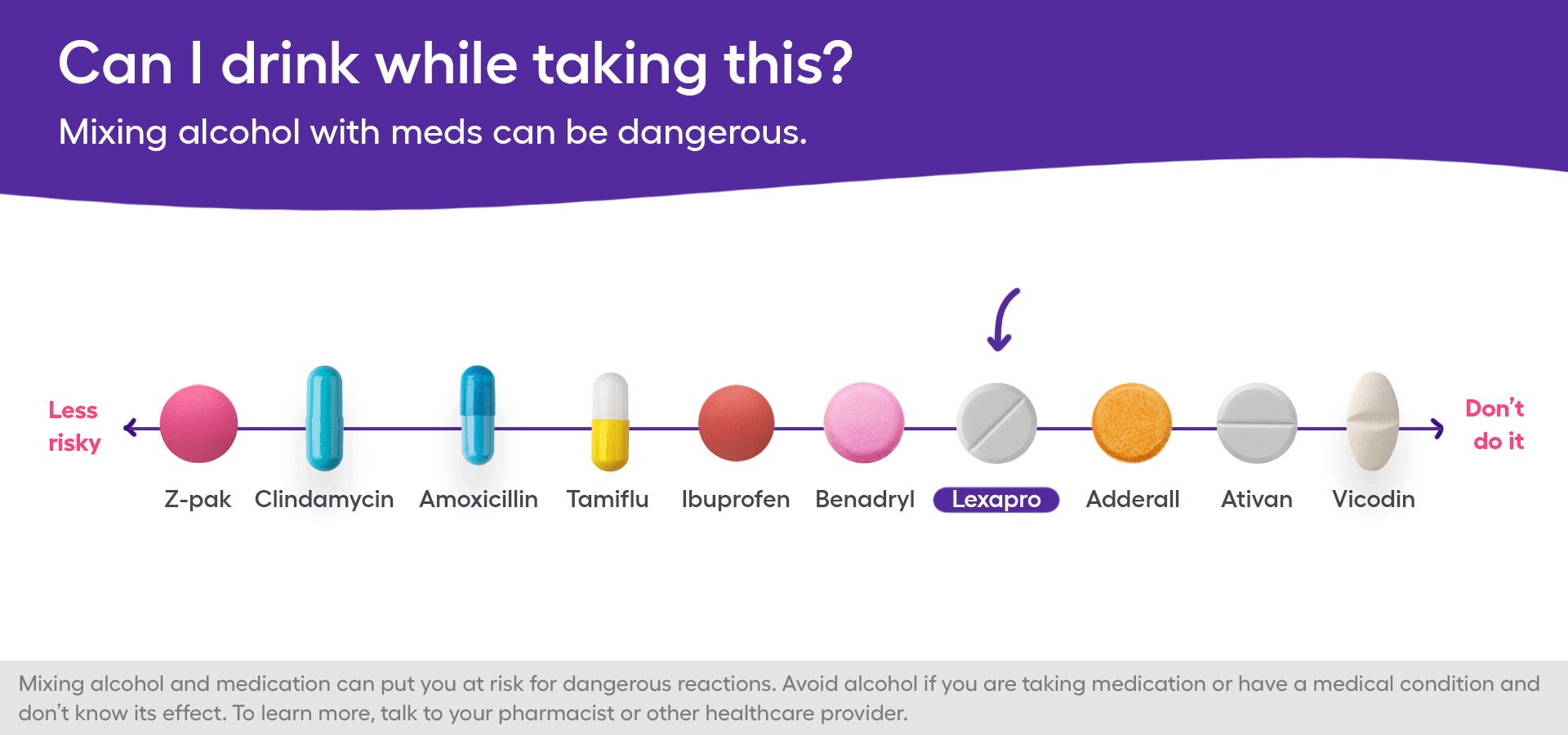Many people feel having a drink can help take the edge off in certain situations, such as after a hectic day at work or at a social gathering. But if you’ve been prescribed Lexapro (escitalopram oxalate), you may want to think twice before sipping your favorite beer, wine, or cocktail. It’s important to know how alcohol interacts with your medications, and this is especially true of prescription antidepressants.
Lexapro is a brand-name drug approved by the Food and Drug Administration (FDA) to treat major depressive disorder and generalized anxiety disorder. Healthcare providers may also prescribe it off-label for other mental health conditions, including social anxiety disorder and obsessive-compulsive disorder. It is classified as a selective serotonin reuptake inhibitor (SSRI). While SSRIs generally have fewer side effects than other types of antidepressants, that doesn’t make it less dangerous to mix with alcohol or other substances.
Mixing Lexapro and alcohol has serious side effects, risks, and potentially dangerous long-term consequences. Read on to learn what health experts say about the proper use of this antidepressant medication and why mixing it with alcohol could prevent you from getting the best results and lead to severe repercussions.
RELATED: Lexapro side effects and how to avoid them
What happens if you mix Lexapro with alcohol?
When you drink alcohol—a depressant that affects your body’s central nervous system—brain activity slows and affects coordination, mood, behavior, and inhibition (self-control). In addition, as an antidepressant, Lexapro also affects the central nervous system, balancing serotonin levels in the brain. Mixing Lexapro and alcohol may both increase certain side effects.
“[Combining the two] can lead to impaired motor skills, memory loss, confusion, dizziness, and an increased risk of suicide or depression,” says Paul Daidone, MD, an addiction medicine specialist and medical director at True Self Recovery in Rogers, Arkansas.
When taken alone, the side effects of Lexapro include fatigue, dry mouth, nausea, dizziness, and drowsiness. When you combine the two substances, you may be at an increased risk of these side effects:
- Impaired judgment
- Worsened coordination
- Severe drowsiness or dizziness
“It’s also important to remember that each of these substances can increase suicidal thoughts and actions,” says Daniel Krinsky, R.Ph., founder of PGx101, a company that provides pharmacogenomics training. “[Taken] together, that risk would increase.”
Just how much impact you’ll see depends on your size, your Lexapro dose, the reason Lexapro was prescribed, and the amount of alcohol consumed, Krinsky explains.
Additionally, Dr. Daidone says that alcohol consumption when you’re taking Lexapro can weaken the effectiveness of the medication and increase symptoms of depression. “Alcohol can reduce the levels of [serotonin], which means that you may experience fewer therapeutic benefits from taking your medication,” Dr. Daidone says.
Even if you took Lexapro earlier in the day, it’s still not a good idea to mix the antidepressant with alcohol. “I do not recommend drinking alcohol at any time while taking Lexapro as it would not make much sense to take antidepressants and then nullify its effects by drinking,” says Dr. Daidone. “Chemical interactions between the two can be unpredictable, and high risks are involved.”

Can you die from mixing Lexapro and alcohol?
Mixing Lexapro and alcohol could theoretically lead to death in certain situations, says Krinsky. For example, you could die from liver damage due to chronic use of alcohol and Lexapro. He adds that because alcohol decreases Lexapro’s therapeutic effects, the depressant effects of alcohol could also lead someone to have suicidal thoughts or take action on those thoughts.
Lexapro and alcohol liver damage
Some research suggests that escitalopram can cause liver damage in rare cases. However, when Lexapro is combined with alcohol, which is also linked with liver damage, the risk is more significant.
“Over time, if the liver is constantly exposed to excessive alcohol and Lexapro, its ability to function properly will be compromised,” Dr. Daidone says. “Alcohol is toxic to the liver and can cause an accumulation of fatty acids, which can lead to an inflammation of the organ known as alcoholic hepatitis.” He adds that combining alcohol and Lexapro could also increase your risk of cirrhosis or liver failure.
Are any SSRIs safe with alcohol?
It’s best to avoid mixing antidepressants with alcohol, according to the Mayo Clinic.
“Folks may read that it’s okay to have a drink or two if they use an SSRI, but it’s important to remember that alcohol must be treated as a drug,” Krinsky says. “As healthcare providers, we do not encourage adding these types of recreational substances or drugs to anyone taking prescription medications.”
If you’re unsure about how your SSRI antidepressant mixes with alcohol, seek medical advice from your healthcare provider or pharmacist. And if you find it hard to abstain from alcohol, seek help from a medical professional to avoid any potential interactions and health risks.
“If your intention of drinking alcohol is to cope with difficult emotions, there are more effective and healthier ways of managing your feelings,” Dr. Daidone says. “Your mental health will only suffer more if you mix alcohol with Lexapro,” he says.”
If you wish to stop taking Lexapro, don’t stop it abruptly. Speak with your healthcare provider about your treatment options and how to taper off the medication to lessen side effects.











